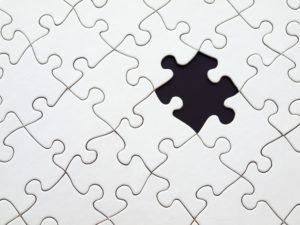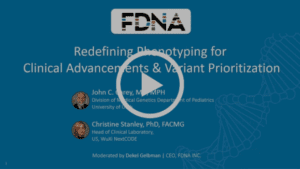Photo from the National Foundation for Ectodermal Dysplasias (NFED) website.
FDNA focused on skin disorders in December for the Year of Discovery. We are uniting healthcare, advocacy, and technology for rare disease advancements. Every time a case is analyzed by Face2Gene, the de-identified case data can train the system to recognize new phenotypes, facial characteristics and genes. This information will improve our understanding of rare diseases and directly impact the lives of patients and families for years to come. As part of this initiative, the National Foundation for Ectodermal Dysplasias (NFED) will receive a charitable donation sponsored by GeneDx.
Dexter’s Journey
Jamie Critchell had a feeling that her son was following in her footsteps when he only developed 18 of his 20 baby teeth. A trip to his pediatric dentist led the family on a journey to a diagnosis of one of the rare types of ectodermal dysplasia called odontoonychodermal dysplasia (OODD), which is an autosomal recessive condition. This means each parent carries a gene for the condition.
The diagnosis would not have happened if this Canadian mom had listened to a care provider who told her that “it wasn’t that bad” and that they didn’t need genetic testing. Jamie trusted her motherly instinct and knew that it could offer understanding and information for her family.
“All moms say that their kids are the sweetest, the most whatever, but in this case, I do truly mean that Dexter is a sweet, caring boy,” said Jamie in an interview with the National Foundation for Ectodermal Dysplasia. “He wants everyone around him to be happy and will do what he can and give of himself to make it happen.”
For the little boy that loved to play with LEGOs and outside in the mud, his family did not feel concern for his health until they realized he was missing two baby teeth. After an initial exam, the family was only left with more questions.
“By asking this question, we also got the answer which we did not want to hear…Dex is missing 14 adult teeth, six of which are front and center with four more visible with a smile. He has a couple of slightly more than normal pointed teeth. So there are some serious concerns not only cosmetically, but also with regards to bite, speech, breathing, and posture. The list really goes on.”
The family soon began to notice even more symptoms including soft, thin, and splitting nails, thickening skin on the bottom of his feet and then there was the fact that Dex wasn’t sweating.
“I went to my family doctor with hopes of getting a genetic test. During this time, I started reading about this a little more and noticed that some of my family members have little parts of this (condition) present in them. This only strengthened my resolve to get him tested.”
The process wasn’t straightforward by any means, and Dexter’s parents faced multiple roadblocks trying to confirm a diagnosis.
“Due to our medical system (in Canada), our family doctor was not able to order the tests and we had to be referred to a pediatric specialist. Once we could get in to see them, then the request was made to our local Children’s hospital. After several months, we got the appointment to meet with the genetics department and interview the doctors.”
“After the interview, we then had Dex’s blood taken. We had to wait to see if the hospital board would approve the funding for the test. A further few more months, we finally got the letter with the diagnosis. Dex was five years old. We knew it would not change anything in our lives but it was such a good feeling to know we have facts and can start to piece together a game plan for his life to make it as ‘normal’ as any other child.”
The family was referred to NFED by their pediatric doctor. They are looking forward to using their resources to find the right clinicians to help Dexter throughout his medical journey—and to connect with other families going through similar experiences.
“It was a long road with some telling us this was not important…it really was and is. It is stunning just how much knowledge is power.”
Read the full original story on the NFED website
What are Ectodermal Dysplasias
The National Foundation for Ectodermal Dysplasias (NFED) is the worldwide expert on ectodermal dysplasias and the only advocacy organization in the United States dedicated to those living with these disorders.
Ectodermal dysplasias are a diverse group of genetic disorders that involve defects of the hair, nails, teeth, skin, and glands. Other parts of the body, such as the eyes or throat, may be affected as well. The combination of physical features a person has and the way in which it is inherited determines if it is an ectodermal dysplasia. For example, hypohidrotic ectodermal dysplasia affects the hair, teeth, and sweat glands while Clouston syndrome affects the hair and nails.
More than 180 different types of ectodermal dysplasias exist. Yet, most types share some common symptoms, ranging from mild to severe. The early diagnosis of a specific type will help identify which combination of symptoms the person has or will have.
This depends on the specific type of ectodermal dysplasia a person has. Even within each type, people can be affected differently depending on the combination of symptoms they have. Any one of the abnormalities may be mild or severe. The physical appearance, then, varies from person to person including within a family and from family to family.
The ectodermal dysplasias are complex. NFED is working with the scientific and medical community to create a new classification system to better define what is and what isn’t an ectodermal dysplasia. This system will include symptoms, genomic information, and biomedical information.
How NFED is Helping Patients
NFED works to connect patients with the best of care through its network of dental treatment centers which feature the most experienced partners at universities and private practices who treat ectodermal dysplasia at affordable costs. They also offer financial assistance to aid with dentures for children, wigs, air conditioners, and cooling vests to help offset some of the more frustrating symptoms of the disease.
NFED offers a program called “First Connect” which gives one-on-one support to help patients learn more about the community of support available to them after a new diagnosis. Their Family Liaison Program can assist the whole family in coping with a parent or child’s diagnosis by listening, sharing experiences, and discussing available resources.
Families have even more opportunities to connect through their annual three-day conference where patients can meet and learn from expert doctors and dentists. Kids and teens spend these three days at “Kay’s Kids Camp” which offers age-appropriate crafts, games, entertainment, and more. To make sure that all families have the opportunity for support—the organization even offers the “Ben Meier’s Golden Ticket Fund” which supplies financial assistance to patients who wish to attend the event.
NFED is committed to the pursuit of information and developing research on treatments for the disease. Through the Ectodermal Dysplasias International Registry patients are asked to share personal information and symptoms for further exploration.
To learn more about how NFED is helping patients and their families across the US please visit www.nfed.org
About GeneDx
GeneDx is a world leader in genomics with acknowledged expertise in rare and ultra-rare genetic disorders, as well as one of the broadest menus of sequencing services available among commercial laboratories. Providing testing to patients and their families in more than 55 countries, GeneDx is a business unit of BioReference Laboratories, a wholly-owned subsidiary of OPKO Health, Inc. To learn more, please visit www.genedx.com
Face2Gene CLINIC is a free, HIPAA-compliant search & reference tool for healthcare professionals. Face2Gene is provided for informational purposes and not intended to replace the clinician’s judgment or experience, nor should it be used to diagnose or treat medical conditions.
*All donations are provided directly by the participating sponsor in such month and at its sole responsibility. Amounts may be capped to a maximum in each month, at the participating sponsor’s sole discretion.



